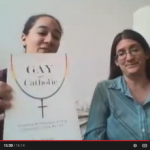This post is number twelve of twelve for the Secular Student Alliance Blogathon. I’m responding to comments in the “Go Ahead, Tell Me What’s Wrong with Homosexuality” thread all day. You can read an explanation of the Blogathon and a pitch for donations (even if you’re religious) here.
At 9am this morning, we kicked of this blogathon on homosexuality with methodological questions about statistics and social science, and that’s how we’re going to fracking end it!
William Saletan is covering a new study for Slate on how children from a variety of family structures turn out. The researchers found that children had the best outcome when raised by a husband and wife who never divorced. Some previous studies rated gay relationships as more evenly matched, but the old studies suffered from a big methodology problem: the way they selected queer families upped the odds that they only pulled in successful ones. The new study tracks children and then asks them about their parents once they’re part of the sample set.
Ross Douthat has a good summary of the problem with the new study, though:
Because it focuses on adult outcomes, Regnerus’s study is necessarily a look backward. No matter where they lived or how they were treated by their peers, many of his subjects came of age when homosexuality was still marginalized and despised and gay marriage barely on the radar screen. The majority were born to male-female couples in which one partner later came out as gay (adding an extra layer of complexity and heartbreak), rather than being planned via adoption, sperm donation or in vitro fertilization. Almost none were raised in a single same-sex household for their entire childhood. Today the models of gay parenting have presumably shifted, the stability of gay households has presumably increased, and the outcomes for children may be shifting as well.
I haven’t gotten to look at the methodology in detail (even to nail down which outcomes they tracked) but from the coverage I’ve seen, I’d be interested in seeing this repeated every five years for the next few decades. Until then, I’m not sure how well it predicts the outcomes of children in same-sex married households now.
And that ends my leg of the Blogathon. I gladly pass the baton to the other SSAweek writers.












